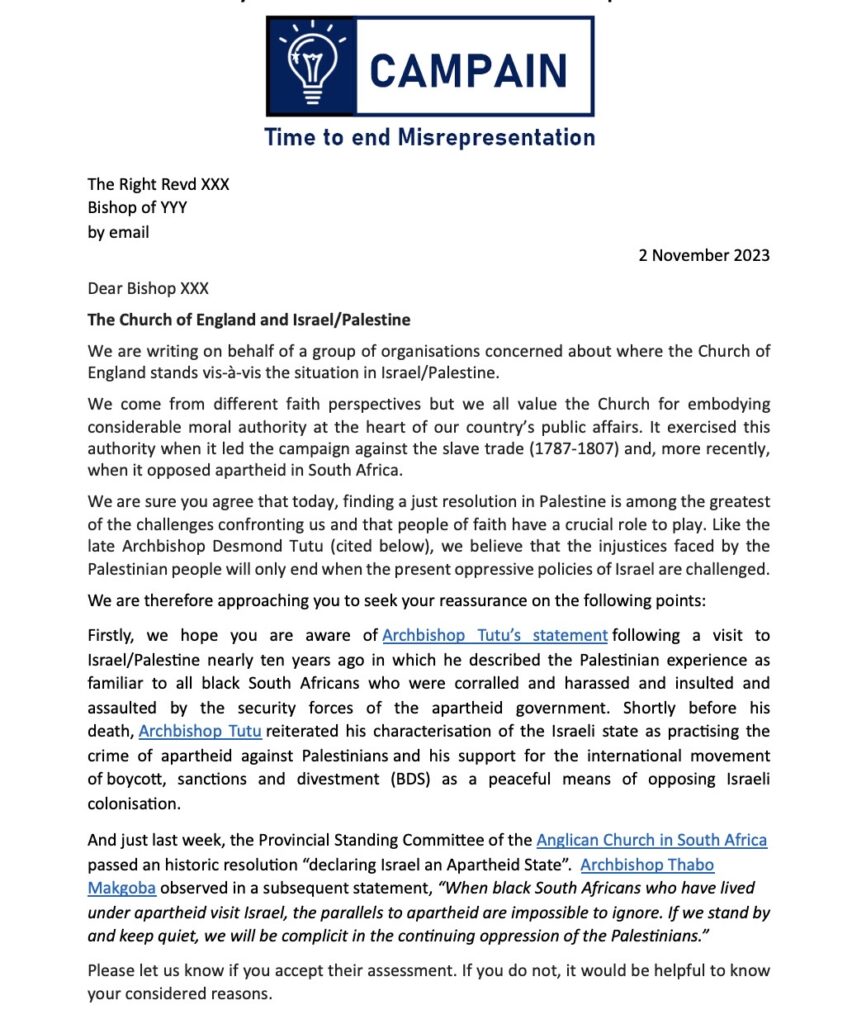

A survey of Anglican Bishops was planned by a coalition of ten Christian, Jewish, Muslim and secular groups[1] that were concerned about the position the Church of England had taken vis-à-vis Israel/Palestine under the leadership of Archbishop Justin Welby. It was executed by CAMPAIN (the Campaign against Misrepresentation in Public Affairs, Information and the News)
An Open Letter of April 25th raised a series of issues, but the matter of most immediate concern was Welby’s denial of the existence of Israeli apartheid, which placed him at odds with the views of late Archbishop Tutu, the Anglican Church of South Africa, renowned international and Israeli human rights organisations, Palestinian Christians and the United Nations.
The purpose of the survey was to ascertain whether other CofE bishops widely shared Welby’s opinion, and if so, why?
In early October, we wrote to 110 bishops, including 103 serving bishops[2] and 7 retired bishops, asking them their view on the matter. Significantly, we wrote before the Gaza war that started on October 7th, and our question was solely about the polity (apartheid or otherwise) that existed before that. However, given the scale of this violence and the publicity it gained, it would undoubtedly colour some of the responses. The full report is here:.
As far as can be ascertained, 105 bishops received the letter, including 98 serving bishops and 7 retired bishops. Only 15 provided some answer, and significantly, the response rate was much higher among retired bishops (71%) than among serving bishops (about 10%).
Only four respondents, all retired bishops, addressed the question about Israeli apartheid. Two of these (Richard Llewellin and Bill Musk) responded in the affirmative, while Michael Langrish described “Israel having had a series of Governments who have pursued apartheid-like policies” but did not like Israel to be described as an “Apartheid State”. Former Archbishop George Carey simply denied the existence of Israeli apartheid without any reasoning to back it up.
Our most important finding is that none of the 105 serving and retired Bishops provided a reasoned rebuttal to Archbishop Tutu et al.’s assessment of Israeli apartheid. None of them argued in favour of Justin Welby’s strongly pro-Israel viewpoint on the matter. It is also notable that no serving bishop (zero out of 96, excluding the two Archbishops) expressed a view on the existence, or otherwise, of apartheid in Israeli/Palestine. We find this unacceptable given the Anglican Church’s and charities’ deep and long-term involvement in Palestine, and the existence of a clear definition of apartheid under the 2002 Rome Statute. Indeed, their low response rate vis-à-vis retired bishops may in part reflect an unwillingness to contradict the Archbishop of Canterbury.
We believe that the Church should challenge the most obvious abuses of power in the UK, particularly as regards its relationship with Israel/Palestine. This should involve, among other things, calling out Israeli apartheid. Another “priority issue” on which the Church could provide invaluable moral advocacy is in support of those pressing for effective regulation of the mainstream media. This is sorely needed to ensure more accurate reporting and uncensored debate on Israel/Palestine and a host of other topics.
Read the full report here
[1] CAMPAIN, Sabeel Kairos, Israeli Committee against House Demolitions (ICAHD-UK), Jewish Network for Palestine, Islamic Human Rights Commission, Jewish Voice for Labour, Muslim Association of Britain, Convivencia Alliance, Peacemakers and Protecting Palestinian Families.
[2] Including the Archbishops of Canterbury and York, 35 diocesan bishops and 66 suffragan bishops.
